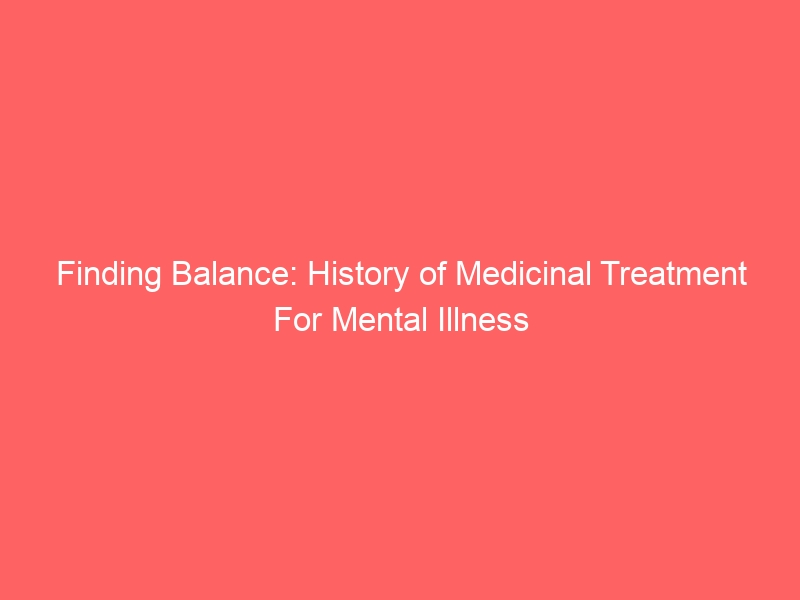It is hard to imagine a time when mental illness was not understood and treated with medicinal means. However, this has not always been the case. For centuries, mental illness was seen as a curse or a sign of demonic possession. It was not until the 19th century that scientists began to study mental illness in earnest, and it was not until the 20th century that effective medications were developed to treat these conditions. There’s much to explore in the history of medicinal treatment for mental illness.
Before Medication
Mental illness has been around for as long as human history. Mental illness was not considered an illness that could be treated medically.
In the early 1800s, scientists began to study mental illness in earnest. They did this by observing patients in hospitals and asylums. These studies led to the development of new theories about mental illness and its causes.
Several treatments were tested, and most of them were incredibly harmful to the patients and did not work. Doctors tried things like bloodletting, purging, and leeches. They also used techniques that would today be considered torture, such as electric shocks and lobotomies.
These continued to provide fallible results.
A new treatment called “moral treatment” was developed. This process focused on providing patients with a supportive and humane environment. while also teaching them life skills so they could be integrated back into society. Moral treatment was shown to be effective in some cases, but it did not work for all patients.
Exploration Into Medication
The 20th century was a watershed moment for the treatment of mental illness. In 1938, the first antipsychotic medication was developed. This marked a major turning point in the way mental illness was treated. Medications became more and more effective as new technologies were developed.
As the years passed, a new class of medications called “psychotropic drugs” were developed. These drugs were designed to treat specific symptoms of mental illness.
The first psychotropic drug was chlorpromazine, which was used to treat schizophrenia. Other drugs followed, including lithium for bipolar disorder and antidepressants for depression.
Things like Adderall and Ritalin are also psychotropic drugs but they are used to treat ADHD.
Successes And Failures
Trial and error come with its complications. When medications were first introduced into treatment for mental illness, not all patients responded well. In some cases, the medications made the symptoms worse. It was not until subsequent years that scientists were able to develop more targeted and effective medications.
Side Effects
Despite the advances in medication, there are still some drawbacks. One of the most significant drawbacks is the potential for side effects. Many mental illness medications can cause a wide range of side effects, from weight gain to sexual dysfunction.
Some patients may experience more severe side effects, such as liver damage or blood disorders. It is important to talk to your doctor about the potential risks and benefits of any medication you are considering.
When malpractice or negligence is involved in the production of the drugs, some side effects and their severity have warranted lawsuits. People seek compensation for the pain and suffering that the side effects have caused.
This is an important conversation to have because it brings to light the need for more research and development in this field.
Seeking Additional Care
Other treatments should work in tandem with psychotropic drugs. These other treatments can include therapy, support groups, and lifestyle changes.
Mental illness is a complex condition, and there is no one-size-fits-all solution. Do not hesitate to seek additional care. There are many resources available to help you find the support you need.
Weighing The Pros And Cons
The decision to take medication for mental illness is a personal one. It is important to weigh the pros and cons of medication before making a decision. Medication can be an effective way to manage symptoms, but it is not right for everyone.
If you are considering taking medication for mental illness, talk to your doctor about the risks and benefits. Together, you can decide if medication is right for you.
Cost of Medication
One of the biggest barriers to treatment for mental illness is the cost of medication. Mental illness medications can be very expensive, and many people cannot afford them.
If you are struggling to pay for your medication, there are a few options available like assistance programs and grants that you apply for.
Some medications are covered by insurance. However, each insurance plan is different, so you will need to check with your insurer to see if your medication is covered.
Impact of Medication
The development of medication for mental illness has had a profound impact on society. Mental illness is now understood to be a medical condition, and it is widely accepted that it can be effectively treated with medication. This understanding has led to reduced stigma and improved access to care.
The world has improved on its sense of compassion and understanding when it comes to the conversation about mental illness. We’ve come a long way but there’s still more to do.

